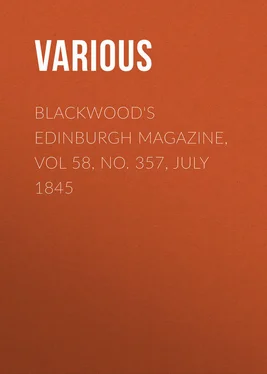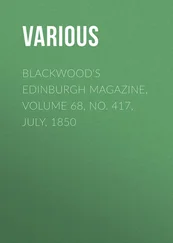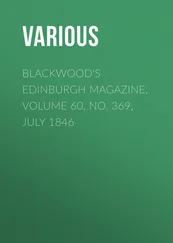Various - Blackwood's Edinburgh Magazine, Vol 58, No. 357, July 1845
Здесь есть возможность читать онлайн «Various - Blackwood's Edinburgh Magazine, Vol 58, No. 357, July 1845» — ознакомительный отрывок электронной книги совершенно бесплатно, а после прочтения отрывка купить полную версию. В некоторых случаях можно слушать аудио, скачать через торрент в формате fb2 и присутствует краткое содержание. Издательство: Иностранный паблик, Жанр: periodic, foreign_edu, Путешествия и география, на английском языке. Описание произведения, (предисловие) а так же отзывы посетителей доступны на портале библиотеки ЛибКат.
- Название:Blackwood's Edinburgh Magazine, Vol 58, No. 357, July 1845
- Автор:
- Издательство:Иностранный паблик
- Жанр:
- Год:неизвестен
- ISBN:нет данных
- Рейтинг книги:3 / 5. Голосов: 1
-
Избранное:Добавить в избранное
- Отзывы:
-
Ваша оценка:
- 60
- 1
- 2
- 3
- 4
- 5
Blackwood's Edinburgh Magazine, Vol 58, No. 357, July 1845: краткое содержание, описание и аннотация
Предлагаем к чтению аннотацию, описание, краткое содержание или предисловие (зависит от того, что написал сам автор книги «Blackwood's Edinburgh Magazine, Vol 58, No. 357, July 1845»). Если вы не нашли необходимую информацию о книге — напишите в комментариях, мы постараемся отыскать её.
Blackwood's Edinburgh Magazine, Vol 58, No. 357, July 1845 — читать онлайн ознакомительный отрывок
Ниже представлен текст книги, разбитый по страницам. Система сохранения места последней прочитанной страницы, позволяет с удобством читать онлайн бесплатно книгу «Blackwood's Edinburgh Magazine, Vol 58, No. 357, July 1845», без необходимости каждый раз заново искать на чём Вы остановились. Поставьте закладку, и сможете в любой момент перейти на страницу, на которой закончили чтение.
Интервал:
Закладка:
John Churchill, afterwards Duke of Marlborough, was born on the 5th July 1650, (new style,) at Ash, in the county of Devon. His father was Sir Winston Churchill, a gallant cavalier who had drawn his sword in behalf of Charles I., and had in consequence been deprived of his fortune and driven into exile by Cromwell. His paternal family was very ancient, and boasted its descent from the Courcils de Poitou, who came into England with the Conqueror. His mother was Elizabeth Drake, who claimed a collateral connexion with the descendants of the illustrious Sir Francis Drake, the great navigator. Young Churchill received the rudiments of his education from the parish clergyman in Devonshire, from whom he imbibed that firm attachment to the Protestant faith by which he was ever afterwards distinguished, and which determined his conduct in the most important crisis of his life. He was afterwards placed at the school of St Paul's; and it was there that he first discovered, on reading Vegetius, that his bent of mind was decidedly for the military life. Like many other men destined for future distinction, he made no great figure as a scholar, a circumstance easily explained, if we recollect that it is on the knowledge of words that the reputation of a schoolboy, of things that of a man, is founded. But the despatches now published demonstrate that, before he attained middle life, he was a proficient at least in Latin, French, and English composition; for letters in each, written in a very pure style, are to be found in all parts of his correspondence.
From early youth, young Churchill was distinguished by the elegance of his manners and the beauty of his countenance and figure – advantages which, coupled with the known loyal principles of his father, and the sufferings he had undergone in the royal cause, procured for him, at the early age of fifteen, the situation of page in the household of the Duke of York, afterwards James II. His inclination for arms was then so decided, that that prince procured for him a commission in one of the regiments of guards when he was only sixteen years old. His uncommonly handsome figure then attracted no small share of notice from the beauties of the court of Charles II., and even awakened a passion in one of the royal mistresses herself. Impatient to signalize himself, however, he left their seductions, and embarked as a volunteer in the expedition against Tangiers in 1766. Thus his first essay in arms was made in actions against the Moors. Having returned to Great Britain, he attracted the notice of the Countess of Castlemaine, afterwards Duchess of Cleveland, then the favorite mistress of Charles II., who had distinguished him by her regard before he embarked for Africa, and who made him a present of £5000, with which the young soldier bought an annuity of £500 a-year, which laid the foundation, says Chesterfield, of all his subsequent fortunes. Charles, to remove a dangerous rival in her unsteady affections, gave him a company in the guards, and sent him to the Continent with the auxiliary force which, in those days of English humiliation, the cabinet of St James's furnished to Louis XIV. to aid him in subduing the United Provinces. Thus, by a singular coincidence, it was under Turenne, Condé, and Vauban that the future conqueror of the Bourbons first learned the art of scientific warfare. Wellington went through the same discipline, but in the inverse order: his first campaigns were made against the French in Flanders, his next against the bastions of Tippoo and the Mahratta horse in Hindostan.
Churchill had not been long in Flanders, before his talents and gallantry won for him deserved distinction. The campaign of 1672, which brought the French armies to the gates of Amsterdam, and placed the United States within a hair's-breadth of destruction, was to him fruitful in valuable lessons. He distinguished himself afterwards so much at the siege of Nimeguen, that Turenne, who constantly called him by his sobriquet of "the handsome Englishman," predicted that he would one day be a great man. In the following year he had the good fortune to save the life of his colonel, the Duke of Monmouth; and distinguished himself so much at the siege of Maestricht, that Louis XIV. publicly thanked him at the head of his army, and promised him his powerful influence with Charles II. for future promotion. He little thought what a formidable enemy he was then fostering at the court of his obsequious brother sovereign. The result of Louis XIV.'s intercession was, that Churchill was made lieutenant-colonel; and he continued to serve with the English auxiliary force in Flanders, under the French generals, till 1677, when he returned with his regiment to London. Beyond all doubt it was these five years' service under the great masters of the military art, who then sustained the power and cast a halo round the crown of Louis XIV., which rendered Marlborough the consummate commander that, from the moment he was placed at the head of the Allied armies, he showed himself to have become. One of the most interesting and instructive lessons to be learned from biography is the long steps, the vast amount of previous preparation, the numerous changes, some prosperous, others adverse, by which the mind of a great man is formed, and he is prepared for playing the important part he is intended to perform on the theatre of the world. Providence does nothing in vain, and when it has selected a particular mind for great achievement, the events which happen to it all seem to conspire in a mysterious way for its development. Were any one omitted, some essential quality in the character of the future hero, statesman, or philosopher would be found to be awanting.
Here also, as in every other period of history, we may see how unprincipled ambition overvaults itself, and the measures which seem at first sight most securely to establish its oppressive reign, are the unseen means by which an overruling power works out its destruction. Doubtless the other ministers of Louis XIV. deemed their master's power secure when this English alliance was concluded; when the English monarch had become a state pensioner of the court of Versailles; when a secret treaty had united them by apparently indissoluble bonds; when the ministers equally and the patriots of England were corrupted by his bribes; when the dreaded fleets of Britain were to be seen in union with those of France, to break down the squadrons of an inconsiderable republic; when the descendants of the conquerors of Cressy, Poitiers, and Azincour stood side by side with the successors of the vanquished in those disastrous fields, to achieve the conquest of Flanders and Holland. Without doubt, so far as human foresight could go, Louvois and Colbert were right. Nothing could appear so decidedly calculated to fix the power of Louis XIV. on an immovable foundation. But how vain are the calculations of the greatest human intellects, when put in opposition to the overruling will of Omnipotence! It was that very English alliance which ruined Louis XIV., as the Austrian alliance and marriage, which seemed to put the keystone in the arch of his greatness, afterwards ruined Napoleon. By the effect, and one of the most desired effects, of the English alliance, a strong body of British auxiliaries were sent to Flanders; the English officers learned the theory and practice of war in the best of all schools, and under the best of all teachers; that ignorance of the military art, the result in every age of our insular situation, and which generally causes the four or five first years of every war to terminate in disaster, was for the time removed, and that mighty genius was developed under the eye of Louis XIV., and by the example of Turenne, which was destined to hurl back to their own frontiers the tide of Gallic invasion, and close in mourning the reign of the Grande Monarque . "Les hommes agissent," says Bossuet, "mais Dieu les mène."
Читать дальшеИнтервал:
Закладка:
Похожие книги на «Blackwood's Edinburgh Magazine, Vol 58, No. 357, July 1845»
Представляем Вашему вниманию похожие книги на «Blackwood's Edinburgh Magazine, Vol 58, No. 357, July 1845» списком для выбора. Мы отобрали схожую по названию и смыслу литературу в надежде предоставить читателям больше вариантов отыскать новые, интересные, ещё непрочитанные произведения.
Обсуждение, отзывы о книге «Blackwood's Edinburgh Magazine, Vol 58, No. 357, July 1845» и просто собственные мнения читателей. Оставьте ваши комментарии, напишите, что Вы думаете о произведении, его смысле или главных героях. Укажите что конкретно понравилось, а что нет, и почему Вы так считаете.












